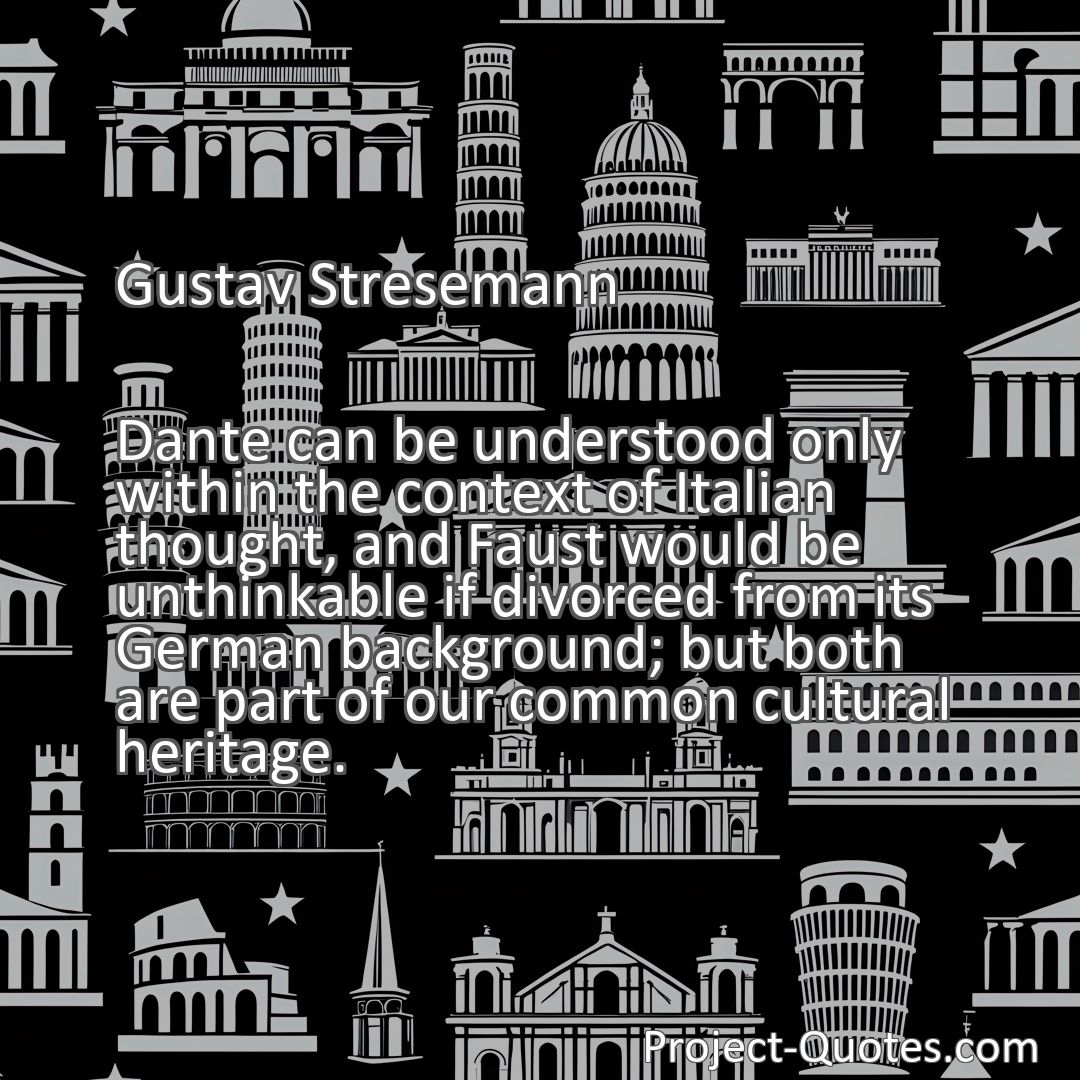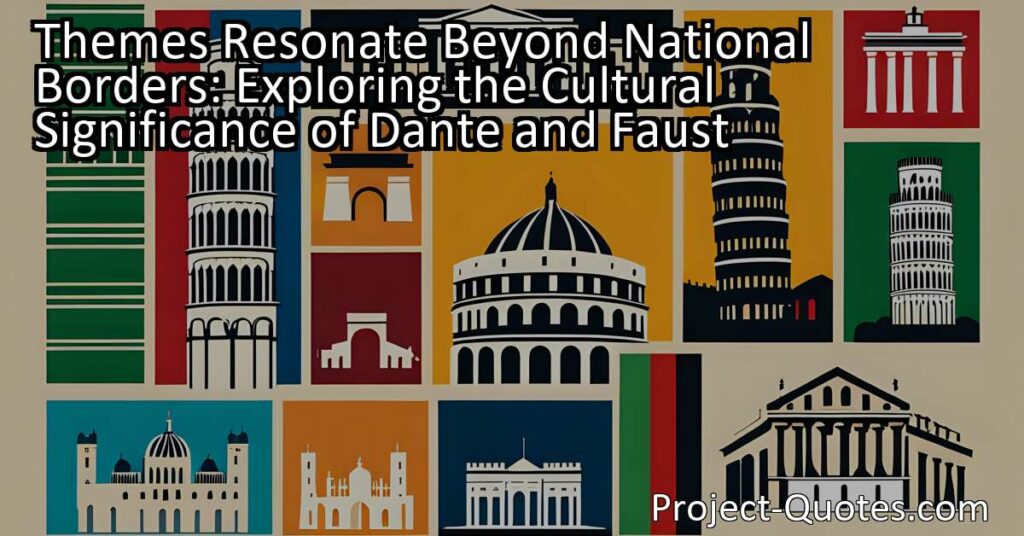Dante can be understood only within the context of Italian thought, and Faust would be unthinkable if divorced from its German background; but both are part of our common cultural heritage.
Gustav Stresemann
Themes Resonate Beyond National Borders: Dante and Faust’s Cultural Significance Explored Discover how the works of Dante Alighieri and Johann Wolfgang von Goethe, deeply rooted in Italian and German cultures, transcend boundaries and become part of our common cultural heritage. With themes of sin, redemption, ambition, and the human search for meaning, these literary masterpieces resonate with readers from all walks of life, transcending language and cultural barriers. Through their exploration of the human condition, Dante and Faust offer timeless lessons and insights that connect us as human beings, regardless of our nationality.
Table of Contents
- 1 Dante can be understood only within the context of Italian thought, and Faust would be unthinkable if divorced from its German background; but both are part of our common cultural heritage.
- 2 Gustav Stresemann
- 3 Meaning of Quote – Dante can be understood only within the context of Italian thought, and Faust would be unthinkable if divorced from its German background; but both are part of our common cultural heritage.
- 4 Freely Shareable Quote Image
- 5 Related
Meaning of Quote – Dante can be understood only within the context of Italian thought, and Faust would be unthinkable if divorced from its German background; but both are part of our common cultural heritage.
Expanding on the Quote “Dante can be understood only within the context of Italian thought, and Faust would be unthinkable if divorced from its German background; but both are part of our common cultural heritage” by Gustav Stresemann
When we think of literature, we often associate it with the cultures from which it originated. Whether it’s the timeless works of Dante Alighieri in Italy or the iconic story of Faust by Johann Wolfgang von Goethe in Germany, these literary masterpieces are deeply rooted in their respective traditions. However, despite their cultural specificity, these works transcend boundaries and become part of our common cultural heritage.
Let’s begin by delving into the world of Dante Alighieri and his enigmatic poem, “The Divine Comedy.” This epic journey through Hell, Purgatory, and Heaven is a cornerstone of Italian literature. Dante’s work is heavily influenced by various aspects of Italian thought, including religious beliefs, political turmoil, and societal norms. Without understanding the historical and cultural context in which Dante wrote, it is difficult to fully grasp the depth and significance of his writing.
The Divine Comedy not only serves as a reflection of medieval Italy but also offers timeless lessons and insights that resonate with readers from all walks of life. Dante’s exploration of sin, redemption, and divine justice speaks to the universal human experience. His vivid descriptions of the afterlife and his encounters with historical figures and mythical beings captivate our imagination and provoke introspection. Despite its Italian roots, The Divine Comedy has the power to transcend language and cultural barriers, making it an integral part of our shared cultural heritage.
Similarly, the iconic story of Faust by Johann Wolfgang von Goethe is deeply entrenched in German culture. Faust is a tale of ambition, temptation, and the eternal search for knowledge and meaning. Set in Germany, the story reflects the socio-political climate and intellectual pursuits of the time. Goethe’s masterpiece has become synonymous with German literature, and its impact on the country’s cultural identity cannot be overstated.
However, like Dante’s work, Faust’s themes resonate beyond national borders. The character of Faust, a scholar yearning for something greater than himself, embodies a universal desire for fulfillment and purpose. His tragic pact with the devil, Mephistopheles, explores the consequences of unchecked ambition and the pursuit of immediate gratification at the expense of one’s soul.
The story of Faust contains moral lessons and philosophical reflections that have stood the test of time. It delves into the depths of the human psyche, urging us to question our own desires and introspect on the choices we make in our own lives. From the disillusionment of Faust to his eventual redemption, Goethe’s work serves as a cautionary tale and an exploration of the human condition.
Despite the Italian and German heritage of these literary works, their impact and significance extend far beyond their respective countries. The varying cultural backgrounds only enhance our understanding and appreciation of these texts as they contribute to our collective cultural heritage. Literature, at its core, is a vehicle for human expression, and these timeless classics serve as a bridge between different cultures and eras.
Dante and Faust have become synonymous with literary greatness and intellectual exploration. Their stories have been translated into numerous languages, making them accessible to people from all around the globe. These works have inspired countless adaptations, including plays, operas, and films, further contributing to their place in our shared cultural heritage. The influence of Dante and Faust can be seen in various art forms, solidifying their position as enduring cornerstones of human creativity.
Furthermore, the themes explored in these literary works resonate with readers of all ages and backgrounds. Dante’s exploration of the human condition and the eternal search for meaning is a timeless theme that continues to captivate readers today. Similarly, the cautionary tale of Faust and the dangers of unchecked ambition remain relevant in a world driven by instant gratification and the pursuit of power.
In conclusion, the quote by Gustav Stresemann emphasizes the importance of understanding literature within its cultural context while acknowledging its place as part of our common cultural heritage. Dante and Faust, two literary giants from Italy and Germany, respectively, have become part of our shared human experience. Though born from specific cultures, their works transcend boundaries, offering universal lessons, insights, and inspiration to readers around the world. As we continue to appreciate and study these literary masterpieces, we foster a deeper understanding of our shared humanity across time, space, and cultural differences.
I hope this quote inspired image brings you hope and peace. Share it with someone who needs it today!


